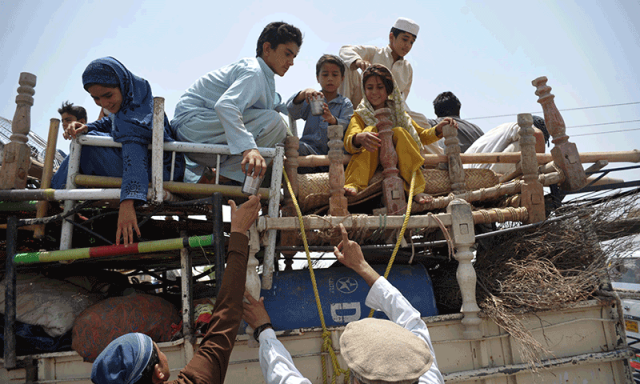IDP crisis unending
Lives as broken as this will take years to rebuild even if military activities are quickly concluded.

IDP crisis unending
When the figures are analysed further a shocking truth is revealed. A worrying majority of the IDPs is made up of women and children. There are 281,829 women and 445,134 children, aggregating to 726,963. There are 249,042 men heading 88,871 families and an entire generation of children from North Waziristan now face a future of uncertainty, a lack of education, poor job prospects and indifferent or absent health care.
This vast pool of miserable humanity have been plunged into beggary in a matter of days or weeks and are reliant on government handouts for just about everything. They carried with them whatever portable items they could carry, the rest they left. All their animals, their fodder, seeds for crops, grains they had already harvested and stored and for many, perhaps most, they left behind their self-respect and dignity. They now spend hours every day in lines waiting for whatever trickles their way. Celebrities such as Younus Khan, Shahid Afridi and Shoaib Akhtar show up from time to time and distribute what they can but it is a drop in the ocean when laid against actual needs. The IDPs say that they are heartened by these visits; but heartened or not there has yet to be revealed any medium-to-long-term plan for these people and there is speculation among some social commentators that it may be better to build new cities for the IDPs rather than send them back whence they came.
Even if that were a viable proposition — and it probably is not — there are tensions below the surface that bode ill. The families that now find themselves in close proximity with one another are by no means a homogenous or even socially comfortable group of people. They lived insular lives that were governed by tribal rivalries and blood feuds, many of which stretch back generations. They were only held in check by careful boundary management. That disappeared with the order to move and now enemies find themselves cheek-by-jowl in the food queues that stretch for miles. The camps that were set up by the government to house the expected influx of IDPs are thinly populated, but it is difficult to accurately gauge just how thinly as access is tightly managed and the media are not welcomed by camp managers.
The psychological health of men, women and children is uniformly poor, it is anecdotally reported. Men are depressed and angered at having to take orders from people they regard as both their juniors and inferiors. Their pride has taken a severe knock and their paranoia in respect of the protection of ‘their’ women is said to be off the scale as traditional purdah systems creak under the strain caused by the displacement.
It is entirely possible that the numbers of IDPs from North Waziristan will exceed a million, and that is before there is any operation anywhere else in the tribal areas. This is a tragedy on an epic scale. Lives as broken as this will take years to rebuild even if military activities are quickly concluded and the extremists ejected or defeated. A generation of children will grow up angry and resentful of the way they and their parents were treated and a vast pool of latent unrest and alienation has been created. An outcome unlikely to have been envisaged by our political masters.
Published in The Express Tribune, July 20th, 2014.
Like Opinion & Editorial on Facebook, follow @ETOpEd on Twitter to receive all updates on all our daily pieces.















COMMENTS
Comments are moderated and generally will be posted if they are on-topic and not abusive.
For more information, please see our Comments FAQ